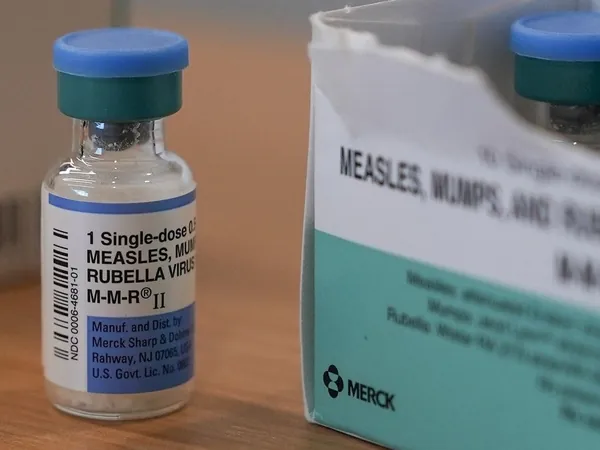
Twinning in Life and Health: One Twin's Battle with Stage 4 Colon Cancer Reveals Alarming Trends in Young Adults
2025-03-24
Author: Jacques
Introduction
In a compelling story of resilience and sisterhood, Brinlee Luster and her twin sister, Mariela, have always shared life’s milestones. From attending the same university to marrying their husbands just months apart, their bond is unmistakably strong. However, their journey took a tragic turn when Brinlee received a life-altering diagnosis.
The Diagnosis
At just 21 years old, Brinlee from Utah began experiencing severe abdominal cramps and overwhelming fatigue that made even her favorite hikes feel impossible. Initially, medical professionals attributed her symptoms to anxiety, potential side effects from birth control, or irritable bowel syndrome — common misdiagnoses that many young women face. As her condition worsened, a colonoscopy ultimately revealed the shocking truth: Brinlee had stage four colon cancer, a situation that no one could have prepared her for.
Sisterly Contrast
In stark contrast, Mariela has remained healthy but took precautionary measures, undergoing a colonoscopy that resulted in the removal of polyps, which, if left unchecked, could lead to cancer. Their experiences underline a growing concern regarding an alarming rise in colon cancer cases among young adults. Recent trends suggest that lifestyle factors such as diet, alcohol consumption, obesity, and sedentary habits play a role, yet Brinlee’s situation implies there may be deeper, less understood mechanisms at work.
Emotional Impact
Speaking to KSL News, Mariela expressed the emotional toll of witnessing her sister battle a disease she couldn’t share: "Having [Brinlee] go through something that I couldn't experience was just so hard." Meanwhile, Brinlee candidly shared, "I don't think anything can prepare you for that moment when you're told you have cancer."
Rising Cases and Concerns
Dr. Mark Lewis, an oncologist at Intermountain Health, highlighted a troubling observation: more of his patients are under the age of 45, raising alarms about when regular colon cancer screenings should begin. He expresses a chilling reality within the medical community: "There really is unfortunately no such thing as too young for colon cancer."
Potential Causes
One potential culprit that Dr. Lewis suggests is the extensive use of antibiotics, starting from childhood. While antibiotics are valuable for eliminating harmful bacteria, their over-prescription has been linked to changes in gut microbiota, which play a critical role in preventing conditions like colon cancer. He notes the worrying rise in antibiotic usage, with prescriptions increasing by 46% worldwide since 2000. Furthermore, a study conducted in 2021 indicated that antibiotic use is more closely associated with colon cancer in younger patients than in their older counterparts.
Expert Opinions
Experts are continually sounding the alarm about the interplay of antibiotics and other lifestyle factors such as obesity and inactivity, which can initiate inflammation in the gut, leading to cellular mutations and cancer development. In 2023, the American Cancer Society forecasts that approximately 154,270 Americans will face a colon cancer diagnosis, with 52,900 tragically succumbing to the disease.
Brinlee's Battle
Brinlee has bravely fought through 30 rounds of chemotherapy, and as of December, she can now proudly say she is cancer-free. In the wake of her diagnosis, Mariela took proactive steps and underwent a colonoscopy that uncovered several polyps, emphasizing the importance of vigilance and preventative care. As Mariela reflected, "I like to think that she really did save my life in a way because I was headed down that route."
Awareness Campaign
Motivated by their experience, the twins have launched a campaign to raise awareness about colon cancer in young adults. They created 'The Port Studio,' a clothing line featuring sweatshirts designed for easy IV access, empowering others undergoing chemotherapy to face their journey with pride. As Brinlee passionately conveyed, "I don't want to hide that I had cancer. Sharing your story is uncomfortable, but I want to be able to share it so that people can be inspired. There's always room for hope."
Conclusion
This story not only underscores the urgency of addressing the rising incidence of colon cancer among young adults but also the indomitable spirit of two individuals determined to turn their challenges into change.









 Brasil (PT)
Brasil (PT)
 Canada (EN)
Canada (EN)
 Chile (ES)
Chile (ES)
 Česko (CS)
Česko (CS)
 대한민국 (KO)
대한민국 (KO)
 España (ES)
España (ES)
 France (FR)
France (FR)
 Hong Kong (EN)
Hong Kong (EN)
 Italia (IT)
Italia (IT)
 日本 (JA)
日本 (JA)
 Magyarország (HU)
Magyarország (HU)
 Norge (NO)
Norge (NO)
 Polska (PL)
Polska (PL)
 Schweiz (DE)
Schweiz (DE)
 Singapore (EN)
Singapore (EN)
 Sverige (SV)
Sverige (SV)
 Suomi (FI)
Suomi (FI)
 Türkiye (TR)
Türkiye (TR)
 الإمارات العربية المتحدة (AR)
الإمارات العربية المتحدة (AR)